Instability in the financial system is a byproduct of speculative excess from "summary" of A Short History of Financial Euphoria by John Kenneth Galbraith
Speculative excess is the breeding ground for financial instability, a fact well known to those who have studied the history of financial euphoria. When individuals and institutions engage in excessive speculation, they create an environment that is ripe for instability. This is because speculation often leads to price distortions and unsustainable trends in the financial markets. During periods of speculative excess, investors tend to abandon rational decision-making and instead follow the herd. This herd mentality can result in the formation of asset bubbles, where prices are driven to unsustainable levels by the collective actions of speculators. These bubbles inevitably burst, leading to sharp corrections in asset prices and widespread financial instability. The after...Similar Posts

Investors often fall victim to cognitive biases when making decisions
Investors frequently make decisions based on cognitive biases, which can lead to suboptimal outcomes. These biases are systemat...

Investors use financial instruments to diversify their portfolios
Investors often seek to diversify their portfolios as a way to manage risk. This involves spreading their investments across di...
Selfattribution bias makes investors attribute successes to their own skill rather than luck
Self-attribution bias is a common psychological quirk that affects how investors perceive their own successes. When investors e...

Dependence on historical data can lead to market misconceptions
When we study the patterns in the market, we often look to historical data for guidance. This is a natural inclination, as hist...
Globalization has expanded market contagion
Globalization, the process by which economies, cultures, and societies have become interconnected on a global scale, has played...

Contrarian strategies can be effective in volatile markets
Contrarian strategies involve going against the prevailing market sentiment, essentially swimming against the tide. This approa...
Market volatility persisted
The characteristic of market volatility persisted is particularly notable during the time surrounding the Great Crash of 1929. ...

Shadow banking activities operate outside traditional regulatory frameworks
Shadow banking activities refer to a range of financial activities conducted by non-bank financial institutions, such as hedge ...
Information cascades play a significant role
The notion of information cascades is a key element in understanding the dynamics of stock markets. An information cascade occu...
Speculative behavior continued
The sense of financial security was ubiquitous in the autumn of 1929. Everyone had a stake in the market, and everyone believed...
